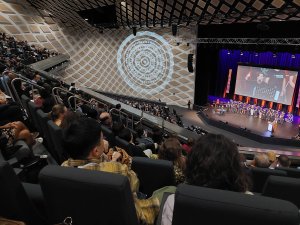Respiratory physician Lutz Beckert considers chronic obstructive pulmonary disease management, including the prevention of COPD, the importance of smoking cessation and pulmonary rehabilitation, and the lifesaving potential of addressing treatable traits. He also discusses the logic of inhaler therapy, moving from single therapy to dual and triple therapy when indicated, as well as other aspects of management
One quiet voice
One quiet voice

Editor Barbara Fountain recently travelled to Sydney with colleague Fiona Cassie to catch up with 4000 family doctors from around the world
This is what happens when you put human rights to a popular vote. How dare you?
It was an end-of-the-day panel discussion on health equity but, ultimately, there was no discussion.
Thousands of GPs in the packed auditorium at the WONCA* conference were left speechless, many in tears.
The session started with WONCA president-elect Viviana Martinez-Bianchi, an Argentine-born family physician from the US, charting her journey as an immigrant and the possibilities for primary care in connecting communities.
Next up, New Zealand general practice academic and Māori health researcher David Tipene-Leach shared the story underlying the development of cultural safety in Aotearoa, from its beginnings in the controversy around the teachings of nurse educator Irihapeti Ramsden, through the development of cultural sensitivity and then cultural competency, before arriving back at cultural safety.
Dr Tipene-Leach gently urged all present to look to the cultural safety paradigm, which involves reflecting on one’s own practice and addressing one’s own bias, to become a better health practitioner.
And that left speaker Brad Murphy, who chose not to take to the podium but to stay seated “with friends”.
From where I sat in the dark auditorium, Dr Murphy was not unlike your average white-haired, maybe 60-ish, European Australian.
Then he introduced himself as a proud Kamilaroi man and a rural doctor.
Thereafter came a softly spoken outpouring of grief over what Dr Murphy called the elephant in the room – the fact Australia as a nation had voted against a constitutional change to give indigenous Australians a “Voice” in Parliament and what this meant for the health of Aboriginal and Torres Strait Islander communities.
*Why WONCA? WONCA stands for the World Organisation of National Colleges, Academies and Academic Associations of General Practitioners/Family Physicians, which is then shortened to World Organisations of Family Doctors but not WOFD
Talking on his own behalf only, he shared his story as an Aboriginal man, from joining the Navy at 15 to entering medical school at 35; of a grandmother who had hidden her true identity to protect her family from racism and had thus lost their family connections.
To be honest, I am not overly familiar with the process that led to the referendum or how it played out with over 60 per cent voting against the change. Dr Murphy explains some of those who voted “yes” were not voting for the referendum but for progress and equity, and some voting “no” were expressing distrust in the Government. The reasons were likely manifold.
There was much more in Dr Murphy’s address, about the wounds created by the referendum, the healing needed, and his own search for his identity. But the phrase that stuck with me as the lights came up was, “This is what happens when you put human rights to a popular vote. How dare you?”
By our publication date, New Zealand should be close to knowing the make-up of the next Government. After all the coalition talks and horse trading, I would hope any thoughts of a referendum on Te Tiriti o Waitangi will be laid to rest.
Can anyone truly believe any good would come of such an outing?
In some areas, we really do not need to compete with our neighbours across the Tasman.
TELL US WHAT YOU THINK
Please add your comments using the comment function below and, remember, if in doubt, check out our comment policy.







![Barbara Fountain, editor of New Zealand Doctor Rata Aotearoa, and Paul Hutchison, GP and senior medical clinician at Tāmaki Health [Image: Simon Maude]](/sites/default/files/styles/thumbnail_cropped_100/public/2025-03/Barbara%20Fountain%2C%20editor%20of%20New%20Zealand%20Doctor%20Rata%20Aotearoa%2C%20and%20Paul%20Hutchison%2C%20GP%20and%20senior%20medical%20clinician%20at%20T%C4%81maki%20Health%20CR%20Simon%20Maude.jpg?itok=-HbQ1EYA)
![Lori Peters, NP and advanced health improvement practitioner at Mahitahi Hauora, and Jasper Nacilla, NP at The Terrace Medical Centre in Wellington [Image: Simon Maude]](/sites/default/files/styles/thumbnail_cropped_100/public/2025-03/2.%20Lori%20Peters%2C%20NP%20and%20advanced%20HIP%20at%20Mahitahi%20Hauora%2C%20and%20Jasper%20Nacilla%2C%20NP%20at%20The%20Terrace%20Medical%20Centre%20in%20Wellington%20CR%20Simon%20Maude.jpg?itok=sUfbsSF1)
![Ministry of Social Development health and disability coordinator Liz Williams, regional health advisors Mary Mojel and Larah Takarangi, and health and disability coordinators Rebecca Staunton and Myint Than Htut [Image: Simon Maude]](/sites/default/files/styles/thumbnail_cropped_100/public/2025-03/3.%20Ministry%20of%20Social%20Development%27s%20Liz%20Williams%2C%20Mary%20Mojel%2C%20Larah%20Takarangi%2C%20Rebecca%20Staunton%20and%20Myint%20Than%20Htut%20CR%20Simon%20Maude.jpg?itok=9ceOujzC)
![Locum GP Helen Fisher, with Te Kuiti Medical Centre NP Bridget Woodney [Image: Simon Maude]](/sites/default/files/styles/thumbnail_cropped_100/public/2025-03/4.%20Locum%20GP%20Helen%20Fisher%2C%20with%20Te%20Kuiti%20Medical%20Centre%20NP%20Bridget%20Woodney%20CR%20Simon%20Maude.jpg?itok=TJeODetm)
![Ruby Faulkner, GPEP2, with David Small, GPEP3 from The Doctors Greenmeadows in Napier [Image: Simon Maude]](/sites/default/files/styles/thumbnail_cropped_100/public/2025-03/5.%20Ruby%20Faulkner%2C%20GPEP2%2C%20with%20David%20Small%2C%20GPEP3%20from%20The%20Doctors%20Greenmeadows%20in%20Napier%20CR%20Simon%20Maude.jpg?itok=B0u4wsIs)
![Rochelle Langton and Libby Thomas, marketing advisors at the Medical Protection Society [Image: Simon Maude]](/sites/default/files/styles/thumbnail_cropped_100/public/2025-03/6.%20Rochelle%20Langton%20and%20Libby%20Thomas%2C%20marketing%20advisors%20at%20the%20Medical%20Protection%20Society%20CR%20Simon%20Maude.jpg?itok=r52_Cf74)
![Specialist GP Lucy Gibberd, medical advisor at MPS, and Zara Bolam, urgent-care specialist at The Nest Health Centre in Inglewood [Image: Simon Maude]](/sites/default/files/styles/thumbnail_cropped_100/public/2025-03/7.%20Specialist%20GP%20Lucy%20Gibberd%2C%20medical%20advisor%20at%20MPS%2C%20and%20Zara%20Bolam%2C%20urgent-care%20specialist%20at%20The%20Nest%20Health%20Centre%20in%20Inglewood%20CR%20Simon%20Maude.jpg?itok=z8eVoBU3)
![Olivia Blackmore and Trudee Sharp, NPs at Gore Health Centre, and Gaylene Hastie, NP at Queenstown Medical Centre [Image: Simon Maude]](/sites/default/files/styles/thumbnail_cropped_100/public/2025-03/8.%20Olivia%20Blackmore%20and%20Trudee%20Sharp%2C%20NPs%20at%20Gore%20Health%20Centre%2C%20and%20Gaylene%20Hastie%2C%20NP%20at%20Queenstown%20Medical%20Centre%20CR%20Simon%20Maude.jpg?itok=Z6u9d0XH)
![Mary Toloa, specialist GP at Porirua and Union Community Health Service in Wellington, Mara Coler, clinical pharmacist at Tū Ora Compass Health, and Bhavna Mistry, specialist GP at Porirua and Union Community Health Service [Image: Simon Maude]](/sites/default/files/styles/thumbnail_cropped_100/public/2025-03/9.%20Mary%20Toloa%2C%20Porirua%20and%20Union%20Community%20Health%20Service%20in%20Wellington%2C%20Mara%20Coler%2C%20T%C5%AB%20Ora%20Compass%20Health%2C%20and%20Bhavna%20Mistry%2C%20PUCHS%20CR%20Simon%20Maude.jpg?itok=kpChr0cc)